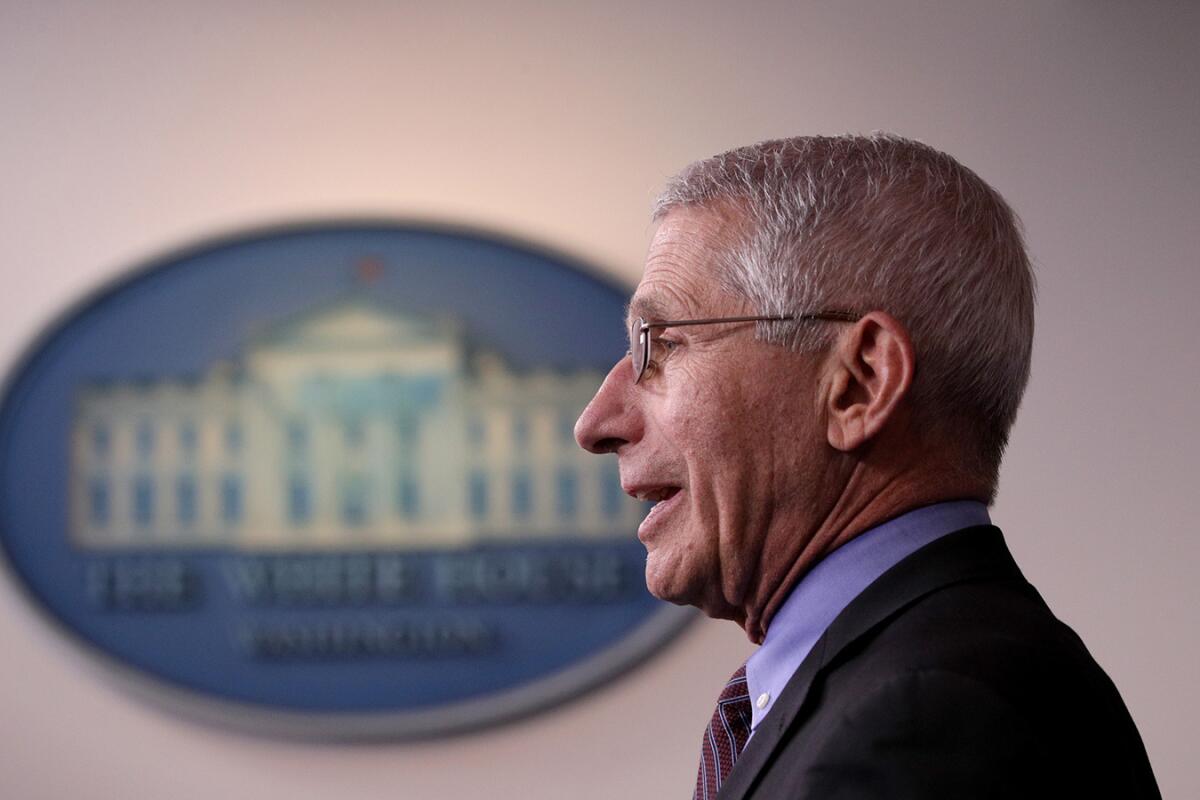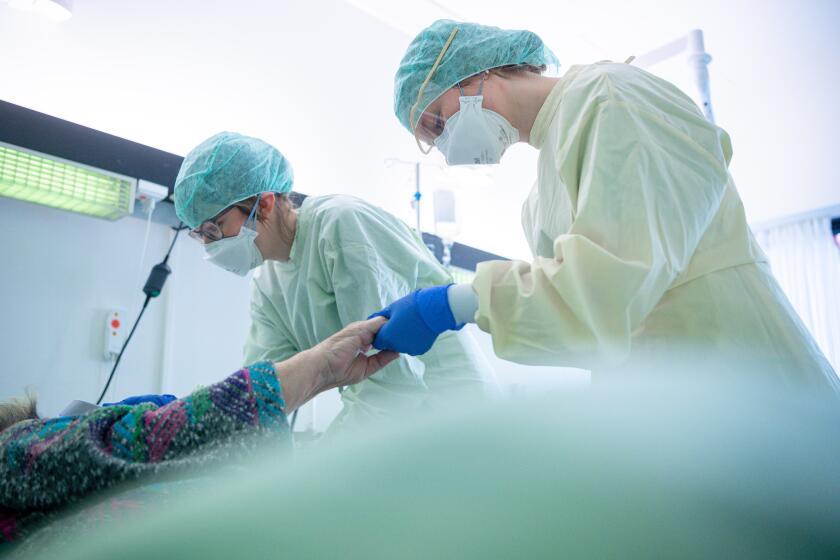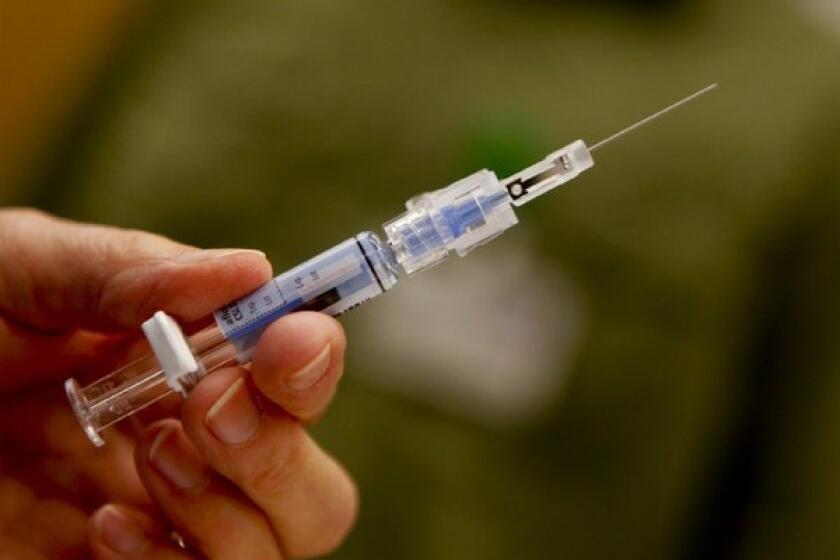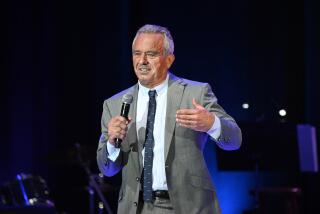Overwhelmingly strong results could end COVID-19 vaccine trials early, Fauci says

- Share via
A COVID-19 vaccine could be available earlier than expected if ongoing clinical trials produce overwhelmingly positive results, Dr. Anthony Fauci, the nation’s top infectious disease official, said this week.
Although two ongoing clinical trials of 30,000 volunteers are expected to conclude by the end of the year, Fauci said an independent board has the authority to end the trials weeks early if interim results are overwhelmingly positive or negative.
The Data and Safety Monitoring Board could say, “The data is so good right now that you can say it’s safe and effective,” Fauci said Tuesday. In that case, researchers would have “a moral obligation” to end the trial early and make the active vaccine available to everyone in the study, he said, including those who had been given placebos — and accelerate the process to give the vaccine to millions.
Fauci’s comments come at a time of growing concern about whether political pressure from the Trump administration could influence federal regulators and scientists overseeing the nation’s response to the COVID-19 pandemic, and erode shaky public confidence in vaccines. Prominent vaccine experts have said they fear that President Trump is pushing for an early vaccine approval to help win reelection.
Fauci, the director of the National Institute of Allergy and Infectious Diseases, said he trusts the independent members of the Data and Safety Monitoring Board — who are not government employees — to hold vaccines to high standards without being influenced by politics. Members of the board are typically experts in vaccine science and biostatistics who teach at major medical schools.
“If you are making a decision about the vaccine, you’d better be sure you have very good evidence that it is both safe and effective,” Fauci said. “I’m not concerned about political pressure.”
The safety board periodically looks at data from a clinical trial to determine if it’s ethical to continue enrolling volunteers, who are randomly assigned to receive either an experimental vaccine or a placebo shot. Neither the volunteers nor the health workers who vaccinate them know which shot they’re receiving.
Manufacturers are now testing three COVID-19 vaccines in large-scale U.S. trials. The first two studies — one led by Moderna and the National Institutes of Health and the other led by Pfizer and BioNTech — began in late July. Each study was designed to enroll 30,000 participants. Company officials have said both trials have enrolled about half that total.
AstraZeneca, which has been running large-scale clinical trials in Britain, Brazil and South Africa, launched another large-scale vaccine study this week in the U.S., involving 30,000 volunteers. Additional vaccine trials are expected to begin this month.
In trials of this size, researchers will know if a vaccine is effective after as few as 150 to 175 infections, said Dr. Robert Redfield, director of the U.S. Centers for Disease Control and Prevention.
“It may be surprising, but the number of events that need to occur is relatively small,” Redfield said.
The coronavirus crisis has upended the status quo in all kinds of ways, and that includes how clinical trials are run.
Right now, only the safety board has access to the trial data, said Paul Mango, deputy chief of staff for policy at the Department of Health and Human Services. As for when trial results will be available, “we cannot determine if it will be the middle of October or December.”
Safety boards set “stopping rules” at the beginning of a study, making their criteria for ending a trial very clear, said Dr. Eric Topol, executive vice president at Scripps Research in San Diego and an expert on the use of data in medical research.
Although the safety board can recommend stopping a trial, the ultimate decision to halt a study is made by the scientists running the trial, Topol said.
A vaccine manufacturer could then apply to the Food and Drug Administration for an emergency use authorization, which can be granted quickly, or continue through the regular drug approval process, which requires more time and evidence.
Safety monitors also can stop a trial because of safety concerns, “if it looks like it’s actually harming people in the vaccine arm, due to a lot of adverse events,” Fauci said.
Fauci said people can trust the process, because all the data that outside monitors use to make their decisions would be made public.
“All of that has to be transparent,” Fauci said. “The only time you get concerned is if there is any pressure to terminate the trial before you have enough data on safety and efficacy.”
Topol and other scientists have sharply criticized the FDA in recent weeks, accusing Dr. Stephen Hahn, the agency’s commissioner, of bowing to political pressure from the Trump administration, which has pushed the agency to approve COVID-19 treatments faster.
Stopping trials early poses a number of risks, such as making a vaccine look more effective than it really is, Topol said.
“If you stop something early, you can get an exaggerated benefit that isn’t real,” because less positive evidence only emerges later, Topol said.
Stopping the studies early also could prevent researchers from recruiting more minority volunteers. So far, only about 1 in 5 trial participants are Black or Latino. Given that people in these groups have been hit harder by the pandemic, it’s important that they make up a larger part of vaccine trials, Topol said.
Doctors at Harbor-UCLA are participating in a COVID-19 vaccine trial, and they’re aiming to recruit people of color and members of other high-risk groups.
Ending vaccine trials early also carries safety risks, said Dr. Paul Offit, director of the Vaccine Education Center at Children’s Hospital of Philadelphia.
A smaller, shorter trial could fail to detect important vaccine side effects, which could become apparent only after millions of people have been immunized, said Offit, who serves on a National Institutes of Health advisory panel on COVID-19 vaccines and treatments.
Researchers will continue to follow vaccinated volunteers for a full year to look for long-term side effects, Redfield said.
And Fauci acknowledged that cutting a trial short could undermine public confidence in COVID-19 vaccines. One in 3 Americans is unwilling to get a COVID-19 vaccine, according to a recent Gallup poll.
Szabo writes for Kaiser Health News, a nonprofit news service covering health issues. It is an editorially independent program of the Kaiser Family Foundation that is not affiliated with Kaiser Permanente.








